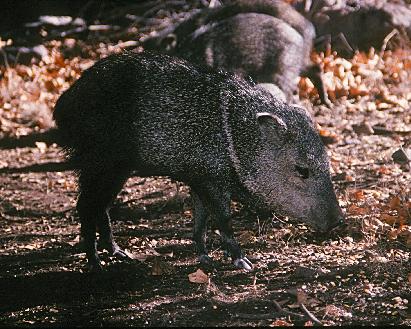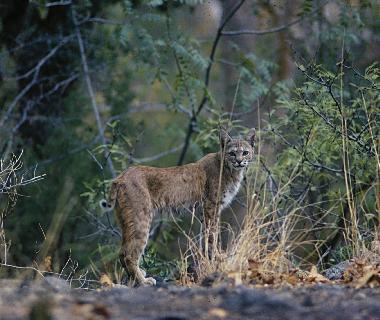There are 83 species of mammals from 6 orders which are found in the Chiricahuas. Their habitats range from Chihuahuan desert scrub to pine forest. From small shrews to mountain lions and black bears, a large variety of mammals can be found in this mountain range.
Below are just a few of the species of mammals which call the Chiricahuas home. See below for a complete list of Chiricahua mammals.


The Coati, also called the Coati-mundi or Chulo (on the left) has a very wide-spread range from South America to southern Arizona. They are found most commonly in woodland and riparian areas. They are related to the raccoon. They are primarily diurnal (active in daytime) and eat a variety of food items, including roots, berries, insects, small mammals, and bird eggs. With their long tails and excellant tree climbing ability many people mistake them for monkeys. Family groups consisting of females and young males can number to as many as 20. Mature males are solitary except during the mating season.
The Gray Fox on the right is fairly common from semi-desert areas to pine forests and is one of two foxes found in the Chiricahuas, the other being the smaller Kit Fox. They have a bushy tail and are grayish above with reddish on the sides and a whitish belly. They feed on small mammals and rodents, insects and berries and are usually seen at dusk and after nightfall.


The Javalina or Collard Peccary many people mistake for a wild pig. Although similar in general appearance the peccary is actually in a separate family. They are found in family groups that can number as many as 15-20 individuals. They are found in a variety of habitats, desert, riparian and pine-oak woodland. Like the Collard Peccary they range from South America to southern Arizona. Like true pigs they root around on the ground and eat a variety of foods including roots, grubs, berries and are particularly fond of the fleshy pads and ripe fruit of the prickly-pear cactus.
The raccoon on the right is one of our most recognizable mammals and is found in semi-desert grassland, woodland, riparian and pine forest, usually near a water source. They are omnivorus meaning they eat a variety of items including plant material, small rodents, birds and bird eggs, fish, insects and fruits. They are nocturnal (active at night).

Townsends' Big-eard Bat is one of 24 species of bats found in the Chiricahuas. They are insect feeders active after nightfall. They roost during the day in caves, old mines, rock crevices and sometimes in abandonded buildings. When roosting or hibernating they many times will curl their large ears over their back. To learn more about this bat and the others found in the Chiricahuas please visit the Chiricahua Bat Page.

83 Species of mammals found in the Chiricahua Mountains
Mammals arranged by family groups, latin name in parentheses.
INSECTIVORA (3)
+Arizona Shrew (Sorex arizonae)
+Dusky Shrew (Sorex monticolus)
+Desert Shrew (Notiosorex crawfordi c. )
CHIROPTERA (25)
+! Mexican Long-tongued Bat (Choeronycteris mexicana)
+! Lesser Long-nosed Bat (Leptonycteris curasoae yerbabuenae)
+?Spotted Bat (Euderma maculatum)
+Cave Myotis (Myotis velifer v.)
+Southwestern Myotis (Myotis auriculus apache)
+Fringed Myotis (Myotis thysanodes t.)
+Long-legged Myotis (Myotis volans interior)
+California Myotis (Myotis californicus)
+Small-footed Myotis (Myotis ciliolabrum)
+Long-eared Myotis (Myotis evotis)
+Occult Little brown Bat (Myotis occultus)
+Silver-haired Bat (Lasionycteris noctivagans)
+Western Pipistrelle (Pipistrellus hesperus h.)
+Big Brown Bat (Eptesicus fuscus)
+Western (Desert) Red Bat (Lasiurus blossevillii)
+Southern Yellow Bat (Lasiurus ega xanthinus)
+Hoary Bat (Lasiurus cinereus c.)
+Allen's Lappet-browed Bat (Idionycteris phyllotis)
+Townsend's Big-eared Bat (Corynorhinus townsendii pallescens)
+Pallid Bat (Antrozous pallidus p.)
+Mexican Free-tailed Bat (Tadarida brasiliensis mexicana)
+Pocketed Free-tailed Bat (Nyctinomops femmorosacca)
+Big Free-tailed Bat (Nyctinomops macrotus)
+Western Mastiff Bat (Eumops perotis)
+Underwood's Mastiff Bat (Eumops underwoodi)
LAGOMORPHA (3)
+Eastern Cottontail Rabbit (Sylvilagus floridanus holzneri)
+Desert Cottontail Rabbit (Sylvilagus audubonii minor)
+Black-tailed Jack Rabbit (Lepus californicus eremicus)
RONDENTIA (29)
+Cliff Chipmunk (Eutamias dorsalis d.)
+Harris' Antelope Squirrel (Ammospermopilus harrisii)
+Rock Squirrel (Spermophilus variegatus grammurus)
+Spotted Ground Squirrel (Spermophilus spilosoma canescens)
+Round-tailed Ground Squirrel (Spermophilus tereticaudus t.)
+Apache Fox Squirrel (Sciurus nayaritensis chiricahae)
+Botta's Pocket Gopher (Thomonys bottae mearnsi)
+Silky Pocket Mouse (Perognathus flavus)
+Bailey's Pocket Mouse (Perognathus baileyi b. )
+Rock Pocket Mouse (Perognathus intermedius i. )
+Desert Pocket Mouse (Perognathus penicillatus p. )
+Hispid Pocket Mouse (Perognathus hispidus conditi )
+Ord's Kangaroo Rat (Dipodomys ordi o. )
+Banner-tailed Kangaroo Rat (Dipodomys spectabilis s. )
+Merriam's Kangaroo Rat (Dipodomys merriami olivaceus )
+Western Harvest Mouse (Reithrodontomys megalotis m. )
+Cactus Mouse (Peromyscus eremicus e. )
+Sonoran Deer Mouse (Peromyscus maniculatus sonoriensis )
+White-footed Mouse (Peromyscus leucopus arizonae )
+Brush Mouse (Peromyscus boylii rowleyi )
+Northern Pigmy Mouse (Baiomys taylori ater )
+Northern Grasshopper Mouse (Onychomys leucogaster ruidosae )
+Southern Grasshopper Mouse (Onychomys torridus t. )
+Hispid Cotton Rat (Sigmodon hispidis confinis )
+Fulvous Cotton Rat (Sigmodon fulviventer minimus )
+Yellow-nosed Cotton Rat (Sigmodon ochrognathus )
+White-throated Woodrat (Neotoma albigula mearnsi )
+Mexican Woodrat (Neotoma mexicana m. )
+Porcupine (Erethizon dorsatum couesi )
CARNIVORA (18)
+Coyote (Canis latrans mearnsi )
+Kit Fox (Vulpes macrotis neomexicana )
+Gray Fox (Urocyon cinereoargenteus scottii )
+Black Bear (Ursus americanus amblyceps )
+Raccoon (Procyon lotor pallidus )
+Coati Mundi (Nasus nasus molaris )
+Ringtail Cat (Bassariscus astutus arizonensis )
+Long-tailed Weasel (Mustela frenata neomexicana )
+Badger (Taxidea taxus berlanderi )
+Western Spotted Skunk (Spilogale gracilis leucoparia )
+Stripped Skunk (Mephitis mephitis estor )
+Hooded Skunk (Mephitis macroura milleri )
+Hog-nosed Skunk (Conepatus mesoleucus venaticus )
*! Jaguar (Panthera onca arizonensis )
*! Ocelot (Felis pardalis sonoriensis )
+Mountain Lion (Felis concolor azteca )
+Bobcat (Felis rufus baileyi )
++! Jaguarundi (Felis yagouaroundi )
ARTIODACTYLA (5)
+Collard Peccary [Javelina] (Tayassu tajacu sonoriensis )
+Mule Deer (Odocoileus hemionus crooki )
+Coues' White-tailed Deer (Odocoileus virginianus couesi)
*Pronghorn Antelope (Antilocarpa americana ) Being re-introduced into much of former range.
*Desert Mountain Sheep (Ovis canadensis ) Being re-introduced into much of former range. One sightning near Portal in 1992
+ Occurs in the Chiricahua Mountain region
* Rare or extirpated species, occasional sightings
++ Recent sightings, but not confirmed.
! Federal / State Endangered Species
? No recent or substantiated records
Copyright 1992-2003 - All Rights Reserved
Charles S. Rau
Southern Arizona Research Consultants
Portal, AZ
BACK TO THE CHIRICAHUA WEB PAGE
Copyright 1998-2003 Charles Rau
All images and text on these pages are under the copyright of Charles S. Rau and CSR Nature Photography, none of the images or text may be copied, reproduced, downloaded or used without the express written permission of Charles S. Rau


